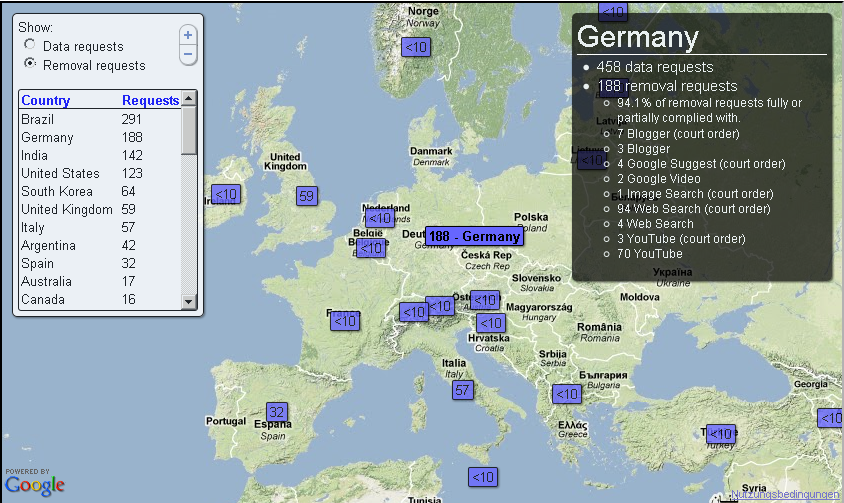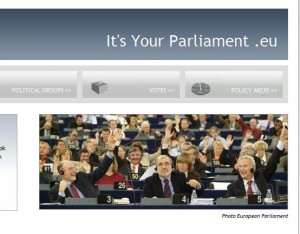Archive for the ‘News’ Category
 |
26. April 2010 – 16:14 by John Heaven (TuTech Innovation GmbH)
|

Wordle, created with wordle.net
If you have something to say about eParticipation in Central and Eastern Europe, you can still participate in the online discourse. However, the forum has closed and we have now created summaries of the discussion. Anyone can edit the summaries using Google Docs, meaning that you still have a chance to contribute until May 7th. These documents will be submitted to the European Commission in a situation paper.
Read the rest of this entry »
Posted in Events, News, Projects, Uncategorized, good practice | No Comments »
 |
23. April 2010 – 11:57 by Madarász Csaba
|
We have not heard too much about Bulgarian e-participation cases. Not a surprise if we now understand a bit better the CEE eparticipation current state. However the case below has happened a couple of years ago, it does help to get a small imprint about how to achieve change through electronic means- particularly, if you are a Bulgarian citizen living abroad.
Starting from February 2005 Bulgarian nationals living abroad, protested with an online petition against “the health insurance taxes
blackmail”. 10000 signatures from people living in 96 countries were collected, asking for a change the Bulgarian health insurance law. The
law disregards the fact that Bulgarian emigrants have regularly paid their health insurance contributions in their respective countries of
residence and forces them to pay this contribution in Bulgaria too.
This continued for almost 2 years before the law was changed. In January 2007 Bulgarian emigrants organized the first Bulgarian rally
in Brussels in front of the offices of the bulgarian diplomatic mission. More than 50 people came from 6 European countries to protest
against the discriminative law.
The opposition party Union of Democratic Forces finally introduced the corresponding law bill, which was rejected by the ruling Socialist
party. On 29 February 2008 MP from the ruling party received thousands of SMS from all around with the same text: Please, do not block the
bill exempting emigrants from health insurance contribution.
Messages blocked their mobile phones and the scandal became a headline news in Bulgaria.
On 27.03.2008 the Parliament amended the bill and emigrants claimed victory. Unfortunately this bill covers the period till the end of
2007 only. Starting from 2008 bulgarian emigrants have to pay again health insurance contribution, but only if they live outside the
European union.
The online petition: https://www.podpiski.org
In the news: https://www.novinite.com/view_news.php?id=75719
(thanks to Boyan Yurukov)
Posted in News, experince | No Comments »
 |
23. April 2010 – 09:00 by Bengt Feil (TuTech Innovation GmbH)
|
I assembled a few articles form the last weeks I found particularly interesting and noteworthy.
But first of all: The second PEP-NET online discourse has been running since April 12th on www.internet-discourse.eu. This discussion about the barriers and potentials of eParticipation in the Central and Eastern European region has been very successful and featured (among other things) three very interesting live-discussions with eParticipation experts from Croatia, Estonia and Slovenia. You can still take part in the third phase of the discussion. More information can be found here.
Now on to articles:
Google made an interesting step in publishing which government requested data or the removal of data from them in the second half of 2009. They also provide the number of requests and specific information on what kind of removal was requested (Youtube videos, blog posts etc.). A short article on this topic can be found on PEP-NET.
Google.com/governmentrequests
Tristan Parker wrote an interesting post on the influence of financial constraints on digital government efforts. He argues that these constraints will drive government (he is talking about the UK) towards more digital government projects and efforts not for their democratic but for their financial benefits. I think this is an interesting point of view and would argue that even though economic pressure might be the impulse the result might also be an improvement of democratic processes. An in-depth analysis can be found on the pages of the Hansard Society.
Headstar.com
MySociety has managed to set up a very large survey with “information on where every candidate in every seat stood on what most people would think were the biggest issues, not just nationally but locally too” through its TheyWorkForYou project. This might be one of the most comprehensive gatherings on data on the candidates positions we ever had in an election. The results will be published on April 30th.
Mysociety.org
Lauren Ivory posted a good (and very comprehensive) presentation by Steven van Belleghem on the online networks around the world. No absolutely new information but good to have it all on one place.
Futuregovnetwork.com
The Centre for Public Scrutiny has published a report on “what internet communication technologies might mean for public accountability”. The full report can be found here.
Cfps.org.uk
Posted in News | No Comments »
 |
21. April 2010 – 11:37 by Bengt Feil (TuTech Innovation GmbH)
|
When we talk about transparency of government data we mostly mean data produced be government (in parliament etc.) which should be public and usable by NGOs and citizens alike. But there is another aspect of transparency which is discussed less often: How are governments using laws and power to request private data from companies and especially web-based companies like search engines and social networks?
Google published all requests for data and removal of content by governments in the second half 2009 on a website . The screenshot below shows the map on that site zoomed to Europe but there is data available for many other countries in the world.
 Click to enlarge
Click to enlarge
Some example numbers: In Germany there where 458 requests for private data and 188 request for removal of content in the second half of 2009. Ten of the removal requests where aimed that the Blogger service and 70 at Youtube. Interestingly Google also publishes the rate of compliance with these requests – which in this case is 94.1%. In other countries there were much more requests: Brazil leads the chart with 3663. For China however no data is available – or as Google says: “Chinese officials consider censorship demands as state secrets, so we cannot disclose that information at this time.“
This shows that there are other sides to government transparency than one might think about immediately. I hope other companies also publish this kind of data in such an accessible way so that we can hold our governments to task for extensive use of laws and power.
Posted in News, good practice | No Comments »
 |
20. April 2010 – 15:06 by Madarász Csaba
|
The European Citizens Intiatiave is on the right track after the Lisbon Treaty to open new gates to the European Commission.

European Citizens Initiative
1 million signature - not so much, if we think about the population of Europe.
The ECI is giving a sharp outlook on their website about the passed public consultation and Commission’s points.
If you have not heard about the ECI -documents below helps to formulate opinion and getting know the project better visit their website https://www.citizens-initiative.eu/ or start browsing the core documents here:
Posted in News, Projects, inclusion | No Comments »
 |
15. April 2010 – 11:38 by Dorothee Ruetschle
|
Am Montag, den 12. April 2010 startete die PEP-NET online-Diskussion zum Thema “online Bürgerbeteiligung in Zentral- und Osteuropa. Zahlreiche Teilnehmer diskutieren aktiv über Fragen rund um Möglichkeiten und Herausforderungen der Bürgerbeteiligung-online (ePartizipation). Ziel der 14-tägigen Diskussion ist die Entwicklung von Grundsätzen, wie das Instrument der online-Bürgerbeteiligung öfters angewandt werden kann und wie die Herausforderungen gemeistert werden können. Sie sind herzlich eingeladen teilzunehmen!
Die von PEP-NET initiierte und moderierte Diskussion wird in mehreren Phasen verlaufen: Zunächst identifizieren die Teilnehmer aktuelle Themen. Anschließend dürfen die Teilnehmer in Live-Chats prominente Gäste aus der ePartizipation-Szene befragen. Wir freuen uns auf spannende Dialoge!
Read the rest of this entry »
Posted in Events, Interview, News, good practice | No Comments »
 |
13. April 2010 – 12:02 by Institute for Electronic Participation
|
This is a short summary of the contribution to the CEE CN background paper provided for the PEP-NET on-line consultation “eParticipation in Central and Eastern Europe: The big questions“.
The table (available in pdf file from the Institute for Electronic Participation web site) representing current United Nations e-participation 2010 index measurement for CEE countries shows, that an average UN e-participation 2010 rank of the CEE region is rank 70th (+24 ranks improvement in relation to 2008) out of 178 countries included in report.
Countries with the highest level of rank improvement are TFYR Macedonia (+ 109), Bulgaria (+ 99), Romania (+ 83), and Albania (+ 66). On the hand, countries like Bosnia – Herzegovina (-37), Ukraine (- 35), Czech Republic (- 26) and Azerbaijan (- 19) are facing the largest position decrease.
Additionally, three sub groups within CEE region can be identified according to the UN e-participation 2010 ranking:
- High level e-participation countries (among the first 30 countries in the world):
Estonia, Lithuania, Slovenia, Croatia and Hungary. All countries except Croatia in this group are a new EU member states.
- Medium level e-participation countries (ranking 31-100 in the world): Bulgaria,
Latvia, Ukraine, Republic of Belarus, Poland, TFYR Macedonia, TFYR Macedonia, Romania,
Azerbaijan, Montenegro, Albania, Czech Republic and Russia.
- Low level e-participation countries (ranking among least developed countries in
the world): Slovakia, Georgia, Armenia, Bosnia – Herzegovina and Serbia.
Additional data will be presented in the next contribution to the background paper focusing on data comparison with the EU and more detailed explanation in relation to specific e-government components (on-line services, telecommunication infrastructure and human capital) in order to provide basic insight into key eGovernment enablers for eParticipation development in CEE region.
Prepared by Simon Delakorda, M. Sc.
Institute for Electronic Participation
Ljubljana, Slovenia
UN e-participation index notice: please note that this index is a very technically oriented index focusing on national governments performances only.
References:
United Nations. 2010. E-Government Survey 2010: Leveraging E-government at a Time of
Financial and Economic Crisis (to be published). Available from https://www2.unpan.org/egovkb/global_reports/10report.htm.
United Nations. 2008. E-Government Survey 2008: From E-Government to Connected Governance. Available from https://www2.unpan.org/egovkb/global_reports/08report.htm.
Posted in News, Trends, members | No Comments »
 |
24. March 2010 – 11:31 by Institute for Electronic Participation
|
Executive summary of presentation from the 11th Bled Forum on Europe Foresight Conference “The Future of Information Society and Challenges for Good Governance”, organized by the Centre for eGovernance development from 10th to 12th March 2010 in Bled, Slovenia:
According to the latest UN E-Participation Index measurement, the majority of South East Europe countries (Albania, Croatia, FYR Macedonia, Moldova, Montenegro and Romania), improved their global standing regarding the quality and usefulness of information and services for the purpose of engaging its citizens in public policy making through the use of e-government programs. Nevertheless, e-participation in SEE region is still falling behind their e-government developments. An overview of current e-participation situation in SEE within government domain is presented, highlighting key elements needed for strengthening e-democracy in the region. One of them is focusing on non-governmental organizations and civil society e-participation experience (e.g. on-line Citizen’s forum) needed for shaping inclusive and citizens oriented e-government policy.
Presentation slides are available at the Institute for Electronic Participation web site https://www.inepa.si/images/stories/mapping_edemocracy_see_region_delakorda.pdf (pdf, 1.49 mb).
As has become customary over the years the conference concluded with a draft declaration, which had been adopted by the participants of the conference. The process of formulating the declaration is based upon the main issues presented by the lecturers and highlighted by the participants in the discussions which followed.
To achieve even wider participation in the formulation of the Final Declaration of the 11th Bled Forum on Europe, your are kindly invited to provide comments, inputs, questions, add issues important to the development of information society not only in South East Europe, but around the world.
Please send your comments or your video responses to info.cegd@cegd.eu until the 12th of April 2010 and make sure your voice is heard and your opinion is included in the final declaration. You can publish your comments directly to European Debates on-line forum facilitated by the Institute for Electronic Participation (INePA) by fulfilling discussion form (Please enter your Username - Uporabniško ime, message Confirmation code - Potrditvena koda and submit your comment - Pošlji. No prior forum registration is required. Forum is also available in English language). The forum is providing a deliberation space for facilitated public debates and consultations on relevant European issues.
Web links to relevant sites:
Draft declaration of the 11th Bled Forum (pdf, 71 kb)
European Debates on-line forum
Simon Delakorda, M.Sc.
Institute for Electronic Participation
Posted in Events, News, Partners, Projects, Trends | 1 Comment »
 |
19. March 2010 – 09:00 by Bengt Feil (TuTech Innovation GmbH)
|
In this article I would like to mention a few interesting posts related to eParticipation in the last two weeks. The goal is to give an overview of what was going on in the eParticipation realm over that time. The full articles are always linked to under the short summaries.
Andrea DiMaio over at the Gartner blog network discusses two reports by the US Government Accountability Office which state that the OpenData and Transparency websites (Recovery.gov, USAsepending.gov) are far from perfect. His take on the issue is that critic at this point in the development towards more transparency and participation to much criticism could be harmful.
Blog.gartner.com
The BBC conducted a world wide survey with over 27.000 participants and found that almost four of five respondents see internet access as a fundamental right. A majority of those questioned believe that the internet improved their freedom. On the flipside several concerns and dangers where mentioned: fraud and easier access to violent and explicit content being among them.
News.bbc.co.uk
mySociety lays out their vision for the twelve months and promises both a new citizen-facing project (FixMyTransport aiming at “connecting and empowering people who share transport problems of different kinds”) and a improved backend system called Project Fosbury (aimed at making the whole process of civic engagement simpler by breaking it down into single steps).
Mysociety.org
The Swiss canton Zug has published its eGovernment and intranet platform iZug as an open source tool which can be used by other public administrations. This is interesting for two reasons: Firstly the iZug tool seems to be feature-rich and may be of interest for other (especially Swiss) administrations and secondly this is another example of the how attractive open source in general and specifically the Plone framework (Python based CMS) has become for public administrations.
Move-online.de (German original)
Google Translation (English)
The Federal Communication Commission (FCC) plans to connect 100 million additional American homes to high-speed broadband (up to 20 times faster than today) over the course of the next years. These plans are laid out in the national broadband plan presented on March 16th. Now the plan has to be adjusted to the roughly 200 recommendations the FCC got from different players. Some of these adjustments will need involvement of Congress which might slow down the process.
Latimes.com
Posted in News | No Comments »
 |
18. March 2010 – 17:03 by Civil College
|

We have seen various examples , how national parliaments are using the data available in parliament records to display on websites.
It is unlikely to have a function to easily find and compare voting records of political groups and individual representatives. The data is from the 2004-2010 years, and obtained from the official site.
This mashup site: www.itsyourparliament.eu provides this function with a really accessible user interface and a possibility to comment.
This social responsible mashup have built and mantained by Buhl & Rasmussen without any financial support from the EU or other is a typical case, that we citizens like, admire and even encourage to follow - when somebody has the spirit, talent and skills to point out and re-engineer information holes based on public data sources.
This example highlights the importance of open standards and open data, which technically makes possible to build a services like this. Just like in the offline world, where accessibility to relevant information is a cornerstone for real participation, here, accessing data in appropriate format (open standard) is equivalent.
Empowerment subnews.
In Hungary, a success story of right defender NGO, HCLU (TASZ) is highlighting the issue of e-participation in civil campaigns.
After a journalist investigation on the planned new Hungarian Motor Race court’s financial background - to involve state aid and loan /see the story here https://www.xpatloop.com/news/63685 -sorry, but the editor has some bugs now/, - a couple of NGO’s, dealing with transparency have started to run a small scale email campaign, to get different data, related to the planned investment.
A few hundreds of emails has resulted a big scandal in the Hungarian political arena, and saved 35billion Euros for Hungary.
Writing an email, signing a petition does worth the time investment of a few minutes. Although, there might be only 1 from 1000 cases to produce such a big saving, but we have to be aware and spend some time to scan trough our facebook group messages and emails.
A few minutes every day can make us better e-and-non-e citizens!
Posted in News, Uncategorized | 1 Comment »













